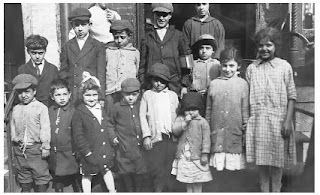The Spirit of Capitalism
 Although Aristide Boucicaut was the first to introduce retail consumerism to Paris in 1838 with his 'Bon Marche', the concept would transport and greatly expand itself throughout New York City only ten years later. Interestingly enough, 1848 was the year Karl Marx would write his revolutionary 'Communist Manifesto', detailing the phases of capitalism and the globalized economy. How would America join on the 'capitalism train'? And why would socialism pervade amidst this growing economic boom?
Although Aristide Boucicaut was the first to introduce retail consumerism to Paris in 1838 with his 'Bon Marche', the concept would transport and greatly expand itself throughout New York City only ten years later. Interestingly enough, 1848 was the year Karl Marx would write his revolutionary 'Communist Manifesto', detailing the phases of capitalism and the globalized economy. How would America join on the 'capitalism train'? And why would socialism pervade amidst this growing economic boom?The Department Store was by far America's ticket to economic success. Upper class women could now find Parisian-style fashions just minutes from their 'millionaire-row' homes, instead of having to travel the distance abroad to obtain these fashions. Even moreso- dresses, shoes, hats, and men's suits could be purchased at a relatively affordable price. By the 1920
 s, many of these items could be purchased in mass consumption, thus propelling the capitalistic market to expand more than ever before. Merchandise was no longer about quality, but quantity. The bigger the better, the greater the richer. There was no stopping this effervescent consumerism from growing. By 1899, Siegel-Cooper of NYC boasted the catchy store slogan, "The Big Store, A City In Itself" and by 1920, Macy's would place itself at the top of the retail chain, posing as the nation's largest department store.
s, many of these items could be purchased in mass consumption, thus propelling the capitalistic market to expand more than ever before. Merchandise was no longer about quality, but quantity. The bigger the better, the greater the richer. There was no stopping this effervescent consumerism from growing. By 1899, Siegel-Cooper of NYC boasted the catchy store slogan, "The Big Store, A City In Itself" and by 1920, Macy's would place itself at the top of the retail chain, posing as the nation's largest department store.In the midst of this growing industrial and capitalist enterprise, aka America, was a world growing richer by the second. The growing textile, steel, and oil industries would push capitalism beyond the hemispheres, creating a growing world market. Textiles from British colonies could be purchased at low prices and sold to the United States to be produced and consumed by the growing population. By feeding industry at home, Americans were enabling colonies abroad, maintaining a unique interdependence that the world could gain from under the guidance of an invisible hand.
At the same time that America was growing richer, problems surfaced on the social welfare front. Industrial conditions were abominable. Families would suffer as men and women put in long hours at the local factories. Alcoholism ran rampant among blue-collar workers and many women would be forced to prostitute themselves to earn more wages to support their children. Upton Sinclair, an American novelist, who wrote and published the American classic, "The Jungle", would portray the vile treatment of American and immigra
 nt workers in Chicago's meatpacking district in the early 1900s. At the very end of "The Jungle" the protaganist, Jurgis, a Lithuanian immigrant who has spent his entire life slaving to American capitalism with little to no benefits or protections by his higher-ups, has lost his wife and his second child and not too long later, becomes a socialist. Sinclair's portrayal of Jurgis does not encourage socialism, but renders its appeal to many who have undergone similar if not exact experiences to that of the character under unprotected capitalism.
nt workers in Chicago's meatpacking district in the early 1900s. At the very end of "The Jungle" the protaganist, Jurgis, a Lithuanian immigrant who has spent his entire life slaving to American capitalism with little to no benefits or protections by his higher-ups, has lost his wife and his second child and not too long later, becomes a socialist. Sinclair's portrayal of Jurgis does not encourage socialism, but renders its appeal to many who have undergone similar if not exact experiences to that of the character under unprotected capitalism. Does America today see itself simply as a capitalist entity with little or no social reponsibility? Yes, we boast ourselves as the richest nation on the planet, but does that make us the best?
China is not too far behind us, but with a strong education system, moral consciousness, and hard-working ethic, this country may already be way ahead. Americans are known for their compassion on the world scene, but when it comes to spending on the right issues, we fail to discern what is most important...those $80 pair of shoes? Or taxes to support fair and affordable health care?
While Marx was correct in his portrayal of globalization during a time of heavy industrialization, he did forget to mention the appeal and benefits of a capitalistic society. He underestimated the power of capitalism by stating that it would one day collapse and communism would soon take over. At the same time, however, capitalist countries have forgotten their priorities: family? education? religion? spirituality? health? comradery?
In conclusion, we may argue that we are the biggest, with a purchasing power parity that matches no other nation. But in the end, does that make us the best? Perhaps by taking time to put away these Christmas checklists, and actually pondering this question, we may be making a good fresh start.
Online References:
-Schoenherr, Steven E. Evolution of the Department Store. http://history.sandiego.edu/gen/soc/shoppingcenter4.html [Feb. 11, 2006]
-Books and Writers: Upton Beall Sinclair (1878-1968) http://www.kirjasto.sci.fi/sinclair.htm
-Macy's Department Store, Company History http://www.wm.edu/amst/370/2005F/sp4/home_macys_generalhistory.htm



Comments